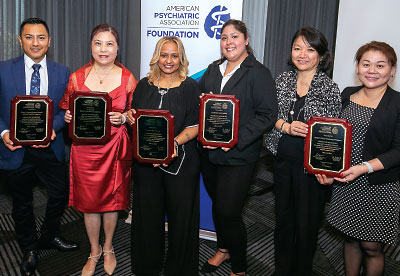Winners of APAF Advancing Minority MH Awards Honored at Annual Meeting
Abstract
The APA Foundation (APAF) honored a number of organizations for their innovative services for minority and underrepresented communities.
The 2019 APA Foundation Awards for Advancing Minority Mental Health were announced at a reception at APA’s 2019 Annual Meeting in San Francisco.

Accepting the 2019 APA Foundation Awards for Advancing Minority Mental Health are (from left) Javier Blas, a mental health therapist at the Mary’s Center’s School-Based Mental Health Program; Bonnie Wong, M.S.W., executive director of the Hong Fook Mental Health Association; Shanti Das, founder and executive director of Silence the Shame; Belen Saravia, mental health program coordinator at La Clínica del Pueblo; S. Eri Asano, Ph.D., director of behavioral health services at the Asian Pacific Development Center’s Asian Elder Wellness Program; and Onki Cheng, behavioral health clinician and community navigator at the Asian Pacific Development Center’s Asian Elder Wellness Program.
The awards, created in 2003, recognize psychiatrists, other health professionals, and organizations that have undertaken innovative efforts to raise awareness of mental illness in underserved minority communities, increase access to care, overcome cultural barriers to care, and improve the quality of care for underserved minorities, particularly those in the public health system or with severe mental illness.
Here are brief descriptions of this year’s winners:
APDC’s Asian Elder Wellness Program: Since 1980, Asian Pacific Development Center (APDC) has provided culturally appropriate and integrated behavioral health cand community-based services to Asian American Pacific Islander (AAPI) immigrants and refugees in Colorado. In 2012, APDC established the Asian Elder Wellness Program, which is a group-based, culture-specific program that provides mental health screening, counseling, and whole-health education for AAPI adults ages 60 and over. It serves over 250 individuals in the Denver and Aurora metropolitan areas, including those of Bhutanese, Burmese, Cambodian, Chinese (Cantonese- and Mandarin-speaking), Japanese, Karen, Karenni, Lao, and Vietnamese backgrounds―ranging from newly resettled refugees to second- and third-generation elders.
CAFY Counseling & Family Center: Community Advocates for Family & Youth (CAFY) has served victims of crimes and their families for over 15 years in Prince George’s County, Md., in partnership with the county’s Police Department. CAFY provides a holistic, trauma-informed approach to its clients who have been impacted by crime. Between 2009 and 2017, CAFY provided services to approximately 10,895 referrals. CAFY’s services includes victim assistance, legal consultations, and mental health services.
Hong Fook Mental Health Association: Established in 1982, Hong Fook Mental Health Association champions culturally competent care and provides a continuum of mental health services from “promoting wellness” to “managing illness” in Asian and other communities, with four offices across the Greater Toronto Area. Hong Fook serves East and Southeast Asian communities in six languages. In the fiscal year 2017, Hong Fook served 5,246 individuals with mental health needs and reached out to 18,229 community members.
La Clínica del Pueblo: Since 1983, La Clínica has played a vital role in addressing the physical and mental health needs of the underserved Latino population in the Washington, D.C., metropolitan area, with a special focus on delivering high-quality, culturally appropriate, and patient-centered health services. La Clínica’s mental health services are among the only culturally and linguistically competent services in the area and are unique in their understanding of the challenges and needs of the immigrant and low-income Latino community. Annually, La Clínica serves more than 4,500 patients with primary and behavioral health services that integrate culturally competent therapies with traditional therapy sessions.
Mary’s Center’s School-Based Mental Health Program: For 30 years, Mary’s Center has been providing culturally and linguistically appropriate services to nearly 50,000 socially and medically vulnerable individuals at eight health care locations throughout Washington, D.C. Historically, Mary’s Center focused on serving low-income immigrant families and the communities in which they live. In 2013, Mary’s Center piloted the School-Based Mental Health (SBMH) program at the request of several D.C. public and charter schools to provide bilingual support for Latino students. In six years, the SBMH program has been expanded to 19 schools with approximately 48,000 students to provide high-quality, on-site, culturally responsive, and trauma-informed behavioral health services.
Silence the Shame: This organization was established to empower and enrich the lives of those in underserved communities around mental health, youth empowerment, and poverty. Its mental health programs support people with mental illness in leading more productive and autonomous lifestyles, while promoting mental wellness through awareness, advocacy, and education. It seeks to normalize conversations surrounding mental health to eliminate stigma associated with mental illness and increase access to mental health resources and treatment. By utilizing iconic figures and influencers for African American communities and other communities of color, Silence the Shame has begun to break down barriers to safely discuss mental health issues without fear of judgement or isolation ■
More information on the APA Foundation’s Awards for Advancing Minority Mental Health is posted here.



